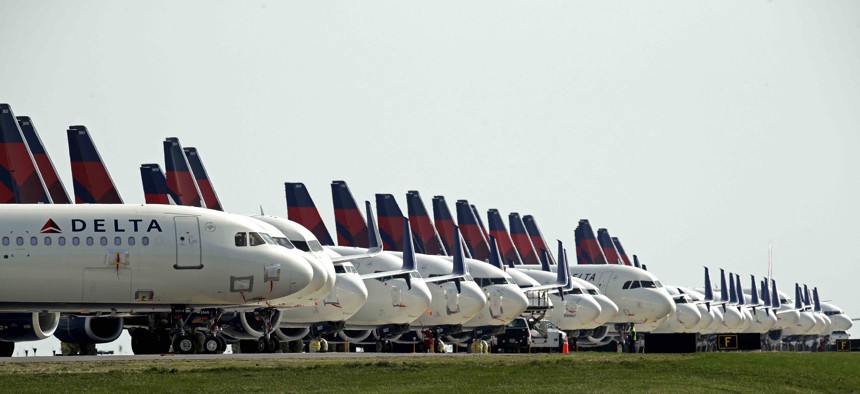In an Airport City, Coronavirus Travel Slump Stokes Budget Worries

Mothballed Delta Air Lines jets are parked at Kansas City International Airport Wednesday, April 1, 2020 in Kansas City, Mo. Air travel has plummeted as the nation fights the coronavirus. That's raising budget concerns for communities near airports. AP Photo/Charlie Riedel
SeaTac, Washington is in relatively good financial shape. But its tax revenues depend heavily on a sector that’s taking a beating during the disease outbreak.
The small city of SeaTac, Washington during the past four years or so has addressed a budget deficit, paid down debt, and built up reserve funds, leaving the city better positioned to deal with an economic downturn, says Deputy Mayor Peter Kwon.
But despite those measures, and the financial buffer they may provide, SeaTac is looking at a hard fiscal path in the months ahead. That’s the case right now for many localities as the coronavirus outbreak batters the nation’s economy. There are reasons, however, why SeaTac, and other towns like it, could be in an especially tough spot.
Located south of Seattle, the city is home to the main international airport that serves the Puget Sound region.
SeaTac has a population of about 30,000. In normal times though, the number of people there surges each day, with about 40,000 employees and 100,000 travelers passing through the airport, according to the city's most recent budget document.
“We are an airport city,” Kwon said. “We are very heavily dependent on everything related to that.”
Airlines, lodging, parking and rental cars are all linchpins for the local economy and generate tax revenue the city relies on to pay for basic services like street upkeep, police and parks.
But the virus is slamming the travel and tourism sector. Authorities have called on people to stay home as much as possible and to avoid non-essential trips, as the nation tries to stop the highly contagious respiratory disease the virus causes from spreading.
As a result, commerce in airport communities has plummeted, undermining the usual flow of taxes.
In an email on Friday, Kwon said that “very preliminary” projections indicate that SeaTac could see spending exceed revenues by $12 million for the remainder of its fiscal year, which closes on December 31.
The city’s planned general fund spending for the year was about $41 million and total spending across all accounts, including the general fund, was around $72 million.
For this fiscal year, Kwon says that the city will likely turn to the robust reserves that it piled up to help fill in any budget gaps. The city's current "excess of reserves" is around $78 million.
“Through the end of the year we should be okay,” he said.
He’s worried, though, about what lies beyond this budget cycle. “Starting in 2021, we're going to be in trouble,” Kwon said. “Because all of the expected revenue is not going to be coming in.”
“The crisis is actually going to be next year—later this year, and next year,” he added.
Kwon noted that airport traffic is currently down sharply and that some hotels are for now closed, including at least one 850-room hotel that also has a restaurant, lounge and cafe.
Hotel occupancy rates in nearby Seattle give a sense of the decline. During the week of March 22 to 28, hotel occupancy dropped to 18.5%, according to STR, a firm that tracks data for the hospitality industry.
In SeaTac, there are a number of ways that city revenue is linked to the airport and the airlines.
“We don't have a mall. We really don’t have much manufacturing and distribution,” Kwon said.
“Really it just comes down to the airport and hotels.”
Parking taxes alone made up about 21%, or $19.6 million, of SeaTac’s $93 million of anticipated tax revenue for the city's current two-year budget cycle. Hotel and motel taxes made up another 4%. Sales tax revenues—poised to take a major hit in many places around the U.S. right now—account for about one-third of the city’s budgeted tax revenue.
Alaska Airlines is the city’s largest taxpayer, with about 21% of the assessed property value in the city, another six airlines account for an additional 17% of the local property tax base.
Compared to taxes tied to sales and other transactions, property taxes are generally more stable, as it takes more time for declines in property value to affect these revenues when a downturn occurs. The taxes make up roughly another third of SeaTac’s tax revenue.
Federal lawmakers recently ushered through a massive relief package that includes money that state and local governments can tap as they navigate the public health crisis.
But how much it will help SeaTac is unclear. Kwon said his city, like other small jurisdictions, is “flying blind without any guarantees” about how much money they will get, because the federal law only provides direct payments to cities with populations above 500,000.
As it stands, he said the city is holding fast when it comes to keeping staff onboard. It has about 122 regular full-time and seven regular part-time employees and hasn’t laid anyone off.
Kwon also pointed out that just because there’s a disease outbreak it doesn’t mean that other city needs have gone away. He mentioned, for instance, a planned project the city has wanted to complete to build pedestrian overpasses on a busy thoroughfare near the airport.
“With the reserves we were actually focusing on pursuing larger scale projects, but now that we’ve got this crisis, I’m not sure where that’s going to head,” Kwon added. “If we spend all of our reserves, then that’s it. We’re back to square one.”
Correction: A prior version of this story incorrectly referred to two-year, biennium budget figures as one-year figures. Those numbers have been updated. A figure that the deputy mayor provided for how much the city had in reserve was also inaccurate and was updated.
NEXT STORY: Extended Income Tax Deadline Is Yet Another Coronavirus Budget Curveball for States






